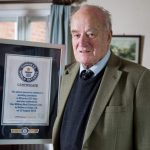This entertaining, humourous biography of a Los Angeles talent agent is also the directorial debut of the actor Mike Myers, who admired Gordon’s genius for creative problem solving during the making of his break-out film, Wayne’s World. Myers calls the film, ‘Six Degrees of Shep Gordon’ referring to Gordon’s network of famous contacts. Gordon was also a great story teller with a cackling laugh. The stories, though verified, sometimes beggar belief.
Young, idealistic child of the 1960s, Shep Gordon wanted to change the world, so he became a probation officer. With his long hair and hippy demeanour, however, Gordon got beat up at work and cut short his career. Driving straight to L.A., he spent his first night there at the iconic Landmark Motel where he raced out to the swimming pool to intervene in a rape, or so he thought. Far from being grateful, the woman punched him in the face. She turned out to be Janis Joplin and her partner, Jimi Hendrix.
Hendrix asked the stranger, ‘Are you Jewish?’
Gordon replied: ‘Yes.
Hendrix told him: ‘You should be an agent.’
Gordon: ‘Who should I manage?’
Hendrix: ‘Alice Cooper.’ Or so the legend goes.
Cooper was Gordon’s client throughout his entire career. At the time, no one was interested in either man, but Gordon’s genius for promoting clients carried the adage that no publicity is bad publicity one step further. Gordon knew that the best way to sell records to young people was to earn their parents’ hatred. Putting Cooper on stage to abuse a chicken or naked under a transparent film was designed to do just that. When the police were summoned, so were the press. In the latter case, when the police arrived the transparent plastic had fogged up and no charges were brought.
The duo was so poor at the beginning that they would skip out of hotels without paying. When the police accused them of stealing towels, Gordon protested: ‘That’s ridiculous, we don’t even wash!’ Once the money came pouring in, Gordon repaid his debt to the hotels.
In the 1970s, ‘things went way too fast,’ with weekends at the Playboy Mansion, drugs and too many women. His client roster included Raquel Welch, black singers Luther Vandross and Teddy Pendergrass and, pro-bono, Groucho Marx at the end of his career. Following Teddy Pendergrass’ car accident that left the sex-symbol a broken man in a wheel chair, Gordon staged his come back at a Live Aide concert in his home town, Philadelphia.
Gordon is a Jewish Buddhist (or JewBu in Hollywood), and became chairman of the Tibet Fund after cooking a Tibetan meal for him! Food runs as a thread through Gordon’s life. He apparently also invented the concept of the ‘celebrity chef’ after learning that chefs were treated like second class talent. Gordon ended up representing a dozen or so celebrity chefs free of charge, putting them on television, negotiating their contracts and turning the celebrity chef into a multi-million dollar industry.
Gordon’s Midas touch extended to his ventures into the film industry, a favour to a colleague whose child has died of cot death. Their first film, Ridley Scott’s The Duellists, won the Palme D’Or at Cannes, and William Hurt won an Oscar for The Kiss of the Spider Woman, another success.
Gordon’s one regret is not devoting enough to his personal life. He did become the guardian of four black children left alone when their mother (he is not the father), one of Gordon’s former lovers, died. He bought them a house in New York and they are frequent guests at his home in Honolulu where he now lives in retirement.
Gordon’s short-lived marriage is notable primarily for the honeymoon story. Staying at an exclusive resort in Fuji, Gordon’s bride, an attractive raw food cook and cookbook writer, urgently needed a computer repair man. The management sent over someone to fix it: his name was Steve Jobs.
While critics of the film, and of Gordon, could point out that the film, with praise from Myers, Michael Douglas, Willie Nelson, Sly Stalone and others, is hagiography, it’s worth pointing out that Gordon rejected Myers’ idea 10 years earlier. As he is now retired, the film cannot promote his business or, as far as we know, his bank account. Moreover, Douglas is honest about Gordon’s womanising and, it’s obvious that for all those who agreed to talk to the camera, many more did not. Still Gordon seems to be the real deal: one of the most colourful, imaginative and generous agents in the business.
Joyce Glasser – MT film reviewer




